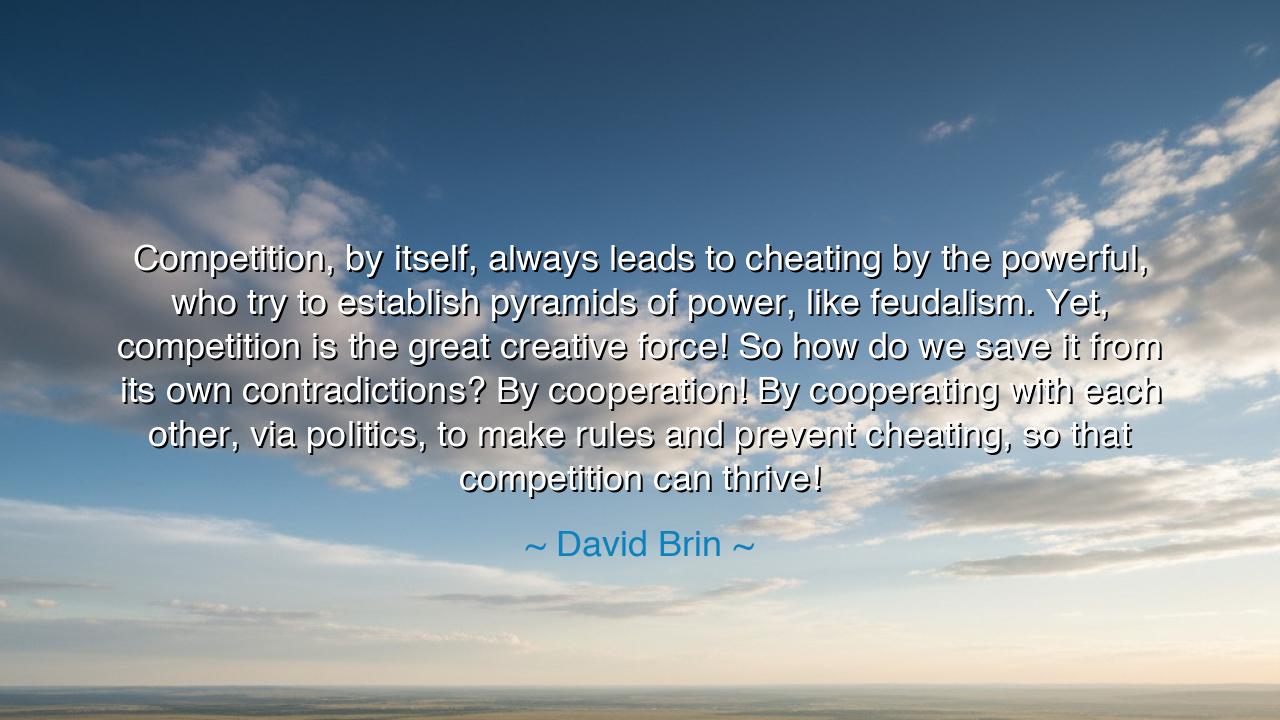
Competition, by itself, always leads to cheating by the powerful
Competition, by itself, always leads to cheating by the powerful, who try to establish pyramids of power, like feudalism. Yet, competition is the great creative force! So how do we save it from its own contradictions? By cooperation! By cooperating with each other, via politics, to make rules and prevent cheating, so that competition can thrive!






“Competition, by itself, always leads to cheating by the powerful, who try to establish pyramids of power, like feudalism. Yet, competition is the great creative force! So how do we save it from its own contradictions? By cooperation! By cooperating with each other, via politics, to make rules and prevent cheating, so that competition can thrive!” Thus spoke David Brin, the modern philosopher of science and storyteller of civilization’s dreams. In these words he touches the very heart of humanity’s struggle — the eternal tension between rivalry and unity, between the striving of individuals and the harmony of the whole. His wisdom calls upon us to master the forces that drive us, not to destroy them, but to balance them — for only through such balance can society endure.
Brin, both scientist and seer, wrote in an age of dizzying progress and peril. The engines of competition — in business, politics, and technology — had given birth to wonders: nations connected by light, minds joined through machines, lives lifted from poverty. Yet the same force that inspires innovation also breeds greed, deception, and tyranny, for unchecked competition bends toward domination. The strong seek to secure their triumph not by excellence, but by control. Thus, he warns, every age risks falling again into feudalism — a world where a few rule from towers of wealth, while the many labor beneath. To save ourselves, we must do what no beast nor tyrant can: we must cooperate to preserve competition itself.
The ancients knew this truth in different forms. The Greek philosophers spoke of balance, calling it sophrosyne, the harmony between excess and deficiency. Too much competition becomes chaos and cruelty; too little becomes stagnation and decay. The Romans, in their laws, sought to restrain the mighty and protect the common man, understanding that civilization depends not only on strength but on justice. And even in nature, the same law reigns: among wolves, the pack hunts as one though each hungers for the kill; among bees, thousands labor for the hive though each has its own task. Thus Brin’s wisdom reflects an ancient pattern — that cooperation is not the enemy of strength, but its guardian.
Consider the rise and fall of Athens, that jewel of the ancient world. Its democracy flourished because its citizens, though fierce in debate and ambition, shared rules that bound them together. Competition in art, philosophy, and politics birthed greatness — Socrates, Sophocles, Pericles — yet all depended upon the cooperative foundation of law. But when the Athenians turned competition into envy, when demagogues broke faith with their fellow citizens, their city fell. Their enemies did not destroy them; their imbalance did. From this we learn the same truth Brin speaks: that without cooperation, competition devours itself.
Yet Brin does not seek to chain competition — he calls it a great creative force, the spark that drives invention and progress. It is competition that moves the craftsman to perfect his art, the scholar to seek truth, the nation to reach for the stars. To destroy competition would be to quench the fire of innovation. But to unleash it without conscience would be to ignite the world. Thus, he teaches that only cooperation through fair rule — through just politics and shared purpose — can preserve the creative fire without letting it consume the house of mankind.
The balance of competition and cooperation is not only a matter for nations or markets; it is a lesson for every soul. In our own hearts, ambition and empathy must learn to live together. The one drives us to greatness, the other ensures that our greatness serves more than the self. The wise person competes fiercely with their own limits, but cooperates generously with others. The fool seeks to win alone, and in doing so, loses the very world worth winning.
Therefore, O listener, take heed of Brin’s teaching. Let your ambition be tempered by compassion, and your striving by fairness. Do not despise competition, but do not worship it either. Work for systems — in your community, your company, your nation — that reward merit, yet forbid exploitation. Participate in politics, not as a weapon of division, but as the sacred art of building rules that guard justice for all. For cooperation is not weakness; it is the highest form of wisdom — the strength of many bound by purpose.
So let this truth be carved into your heart: competition creates, but cooperation sustains. Like the bow and string, they are useless apart, but together, they launch the arrow of progress. Guard this balance well, for it is the foundation of civilization itself. And remember, as Brin teaches, that the fate of our world — its freedom, its fairness, its future — depends not on the triumph of the strong, but on the harmony of the many who choose to work together so that all may rise.






AAdministratorAdministrator
Welcome, honored guests. Please leave a comment, we will respond soon